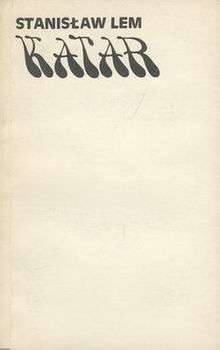The Chain of Chance

The Chain of Chance (original Polish title: Katar, literally, "Rhinitis") is a science fiction/detective novel by the Polish writer Stanisław Lem, published in 1975. Lem's treatment of the detective genre introduces many nontraditional elements. The reader is prompted not only to consider various suspects as possible culprits in a series of murders, but also the possibility that they have all happened purely by chance (hence the English title). In this way, the natural laws of probability and chaos theory play the role of suspects and characters in a murder mystery, lending elements of science fiction to the novel. The underlying philosophical idea is exploited by Lem in his major essay The Philosophy of Chance.
Plot
A former astronaut is hired by a detective agency to help in an investigation of a case of mysterious deaths. Several victims became mad and committed suicide during their vacation in various Naples spas, apparently without reason. Due to certain similarities in the circumstances of the deaths the case is assumed to be a serial murder by poisoning, although it is never certain what (if any) real connection exists between the victims.
During the investigation, it becomes apparent that certain innocent chemicals can be combined into a strong depressor, a kind of chemical weapon. The hero experiences its effects, but his training helps him to survive and solve the case. He discovers the industrial sources of the chemicals, and demonstrates how random chance chemical reactions led to the string of deaths.
Comments
Comparing to Lem's other mystery novel, The Investigation, Lem himself notes that the latter one is rather overstretched, while the story in Katar is more credible. [1]
A review of The Chain of Chance can be found on the Kirkus Reviews website.[2]
References
- ↑ "Katar", notes on Lem's website
- ↑ Kirkus' Review: THE CHAIN OF CHANCE (reviewed on August 1, 1978)